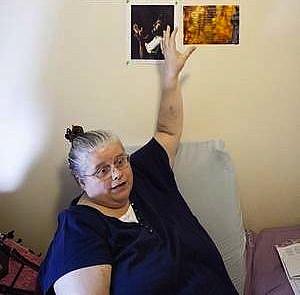Former soccer mom turned addict helping other women
Laura Ungar wrote these stories for The Courier-Journal as a 2012 National Health Journalism Fellow. Other stories in this series include:
Native spirituality helps some cope
Recovery Kentucky centers use a supportive program in which the clients hold one another accountable
Treatment options for tackling addiction can vary from hours to months
Waiting-list names haunt woman at The Healing Place in Louisville
Funds for infant withdrawal syndrome are scarce
Many more Kentucky babies being born addicted
Addicts overwhelm Kentucky's drug treatment options
Defeated by drugs, Kentucky man takes his own life
Oregon's success in treating addicts is a lesson for Kentucky Perscription tragedy

PORTLAND, ORE. — Patricia Green was a soccer mom and PTA vice president who fell victim to pain pills and wound up behind bars. Today, she’s “mom” to young addicts who live in the sober-living complex she calls home.
And like Green, many of the recovering addicts come to the Central City Concern Richard L. Harris Building directly from prison.
“You’re released from prison at 7 a.m. It’s this incredibly long day, and generally we just have the clothes on our backs,” said Green, a 50-year-old divorced mother of two grown children.
She gives the women food, a map of Portland and items such as sample-size toothpaste and other toiletries from supplies she keeps in her room. “I just kind of be there for them to help them on their way. I’ve walked the walk. I know it’s hard.”
Green said she was raised in a family in which people shared and misused prescription medications and didn’t realize that doing so was wrong.
She said she began abusing painkillers around 2004, after being prescribed them for osteoarthritis and chronic pain. She started “doctor-shopping” to get the pills she craved.
She said after she left her husband, a relative “took me under his wing.” She said she had been emotionally abused and had no experience managing money.
In 2009, she was arrested, and in 2011 a judge found her guilty on multiple counts of theft for stealing from her relative. She was sentenced to more than a year in prison.
The arrest and prison wound up saving her life, she said.
She stopped abusing pills and, while jailed underwent a six-month residential treatment program, growing to understand her criminal and manipulative behavior.
She attended 12-step addiction recovery meetings and group therapy sessions. She learned how to live more healthfully and better manage her diabetes, eventually dropping from 367 pounds to 263.
Green was released from prison in February and went directly to the Richard L. Harris Building. Through Central City Concern, a multi-faceted social-service agency in Portland, she sees a mental health professional and occupational therapist, participates in cooking and healthy eating courses, and avails herself of many types of “holistic” care, including acupuncture, yoga and aromatherapy.
She said it’s all helped her stay sober. “There are so many ways to get help,” she said. “You have to try.”
She said some of the women she tries to help still return to drug use, but she focuses on the ones who succeed.
She recalled one young woman who got a job within two weeks of arriving and told Green, “I would have been lost without you.” She said another woman thanked her for the simple kindness of giving her a blanket, saying, “I’m warm at night because you helped me.”
Green said she hopes to continue giving others “a hand up” for the rest of her life.
“There are so many people in need,” she said.
This series was first published in the Courier-Journal on December 16, 2012
Photo Credit: Alton Strupp/Courier-Journal

